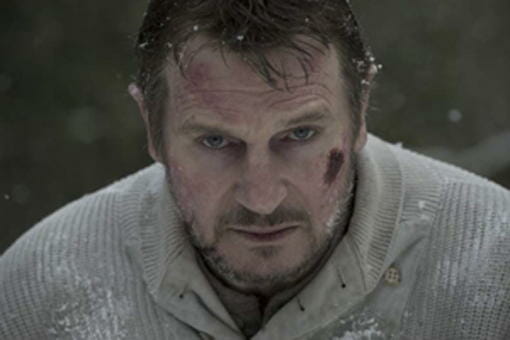By Jim Rohner · January 28, 2012

"Once more into the fray
Into the last good fight I'll ever know.
Live or die on this day
Live or die on this day."
This stanza, the closing lines to a letter that will never be seen by its intended recipient, are the lingering remnants that Ottway (Liam Neeson) has of his long-dead father. Though a refrain constantly repeating in his mind, the possible significance to the poetic verse has been lost on Ottway since the separation from his wife, to whom he was writing.
Perhaps it's to escape the pain of a former life or to exit this life with as little fanfare as possible that Ottway finds himself working a job at the end of the world. Working security for an oil drilling team, Ottway's primary task is to protect the crew from packs of wolves that inhabit the frozen tundra. Though exceptional at his job, one wonders, especially when he contemplates the rifle barrel in his mouth, if Ottway would even bother if not for the fact that the survival of others depended on him.
This fact becomes tragically and immediately apparent when a return flight home crashes in the middle of the wintery Alaska wilderness killing all but Ottway and six of his companions. Fire and food become the most immediate concerns until nightfall when growls and guttural moans are emitted from the seemingly countless pairs of eyes reflecting the survivors' meager fire. On an industrial oil rig and armed with a rifle, the wolves are out of their element. But this is the grey – the vast, infinite abyss of wind and snow and biting cold. Here, the men are the intruders.
Soon enough, the wolves turn seven into six and six into the five with which The Grey will primarily concern itself: Ottway, Burke (Nonso Anozie), Talget (Dermot Mulroney), Diaz (Frank Grillo), and Hendrick (Dallas Roberts). At Ottway's behest, the men make for a distant tree line where perhaps they can find refuge from the beasts. Perhaps there they'll be far away from the wolf den and their subsequent hunting ground; or perhaps, they'll be right in the heart of it. As the men struggle for survival, those poetic words begin to take on a hard, clear meaning for Ottway.
"Once more into the fray…"
What makes The Grey so effective is that "the fray" is not relegated to just a struggle of man vs. nature. Yes, the trailer promises a fantastically tense scene involving cliff jumping and another in which alpha male Ottway, broken bottles and a survival knife secured to his fists with electrical tape, squares off with an alpha wolf and the film delivers on those promises. But those scenes all take place well after Joe Carnahan and co-writer Ian Mackenzie Jeffers have taken the time to shape three-dimensional characters who think, who feel, who are fighting to get back to someone or something. Neeson could run through the Alaskan wilderness, tearing wolves to bits with his bare hands, but there wouldn't be a reason to care at all if not for the fine job Carnahan does fleshing out his backstory and the reason behind Ottway's weariness.
It's in said backstory that the other meaning of "the fray" comes into focus. Just as Ottway and his companions stare across the grey of a vast, snowy abyss wondering what awaits them, so too do they openly wonder about the grey of the vast sky above them and the presence or absence of a higher power that may or may not occupy it. What reason, other than to serve as a guide to those men who do wish to return home, does Ottway have to survive? Do these men, who are hundreds if not thousands of miles away from home, even have any right to survive? Are these men flawed? Yes. Do they deserve death? Not necessarily. But the grey does not belong to them; the grey belongs to the wolves, to nature. It is thus not horror that keeps us intrigued with The Grey, but dread – that unshakable knowledge that something, be it God or be it fate, lingers just beyond our field of vision, something that is more powerful than us, something that we do not understand.
Throughout history, mankind has shown a remarkable resiliency and will to survive, but even more impressive is how nature has shown the ability to even itself out, to correct the mistakes it or we make. If all these men were to die, would it be the act of an absent God or business as usual? Carnahan raises these questions subtly yet effectively without handing us any easy answers. Perhaps, in the end, the best we can ask for is to just say, as Ottway does, "fuck it. I'll do it myself."
"Live or die on this day…"